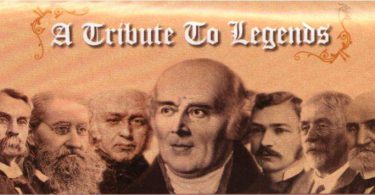
Introduction – In homoeopathy field in recent yrs we seen drastic changes. Old Central Council of Homoeopathy –CCH dissolved on 5th July 2020 and new National Commission of Homoeopathy –NCH is started working with new ideas. Now the question arises that is it necessary to change the old system to new. For the answer we must overlook the history of homoeopathy in India, regulatory authorities, their working style and then need of change.
Reasons and objects – The new NCH act 2020 is concerned with all stakeholders of homoeopathy like students , teachers, homoeo practioners and also colleges .Registration in electronic form both in state as well as national register will help Practitioners .students has to get through exit test before starting their clinic . Teachers should give eligibility test to boost their knowledge.By new act , colleges has to form their website and in future rating can be given to them by the NCH.Due to all these reason it is essential that not only students, teachers but also homoeo practitioner should know the provisions in the new act. In the article, more focus is given on those points which are concerned with homoeopath in his day to day practice.
HISTORY OF HOMOEOPATHY IN INDIA IN LAST 45 YRS – In early 19th century in Bengal homoeopathy was practiced at very small scale and now more than 2,ooooo registered homoeopaths are practicing all over India and near about 12000 added every yr.
- 1st act –The Homoeopathy Central Council (HCC) Act, 1973 (59 of 1973) was enacted in 1973 to provide A solid foundation for the growth of Homoeopathy medical education and provides for constitution of the Central Council of Homoeopathy for regulation of the educational standards of Homoeopathy, maintenance of the Central Register of practitioners and for matters connected therewith.Colleges – Previously No. of colleges opened for homoeopathy education in various parts of India . Eligibility of admission , Duration of course was short previously as compared to present curriculum.Degree – In the beginning ,local councils giving degrees like -DHB,LCEH, GCEH,DHMS ETC.Then UNIVERSITIES STARTED COURSES –BHMS, M.D (HOM) AND NOW PHD
OBSERVATION OF CENTRAL GOVT.
- Central govt agencies were observing all activities related to homoeopathy and seems that not satisfactory with working in homoeopathy. To cop up with this Govt made amendments in previous act 2 times i.e. – Homoeopathy Central Council (Amendment) Bill, 2005 and The Homoeopathy Central Council (Amendment) Bill, 2015. In 2016, the Central Government constituted a Committee chaired by Vice-Chairman,NITI Aayog to review the Homoeopathy Central Council Act .
- Committee recommendation –The committee came to the conclusion that; the said Homoeopathy Central Council Act has not kept pace with time. Various bottlenecks have crept into the system with serious detrimental effects on medical education and by implication on delivery of quality health services and so recommended Enactment of the National Commission for Homoeopathy on the same lines as that of the National Medical Commission Bill, 2018 which has been introduced in Lok Sabha.Then THE NATIONAL COMMISSION FOR HOMOEOPATHY BILL, 2019 formed and introduced in parliament, which was afterwards converted into NATIONAL COMMISSION FOR HOMOEOPATHY ACT, 2020.
- By this way ,NATIONAL COMMISSION FOR HOMOEOPATHY ACT, 2020 Enacted by Parliament in the Sixty-ninth Year of the Republic of India and received the assent of the President on the 20th September, 2020
(Reference – THE NATIONAL COMMISSION FOR HOMOEOPATHY BILL, 2019 STATEMENT OF OBJECTS AND REASONS)
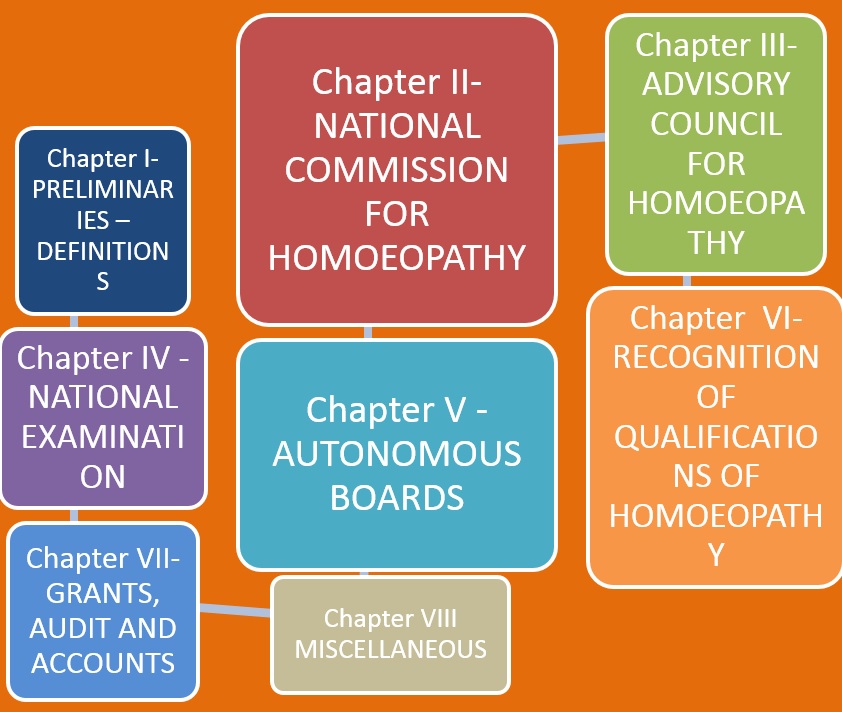
NATIONAL COMMISSION FOR HOMOEOPATHY ACT, 2020
CONSTITUTION OF NATIONAL COMMISSION OF HOMOEOPATHY
The Commission shall be a body corporate.
The head office of the Commission shall be at New Delhi.
Search committee for appointment of Chairperson and Members.
Composition of National Commission for Homoeopathy
A) Chairperson;
(b) Seven ex officio Members
(c) Nineteen part-time Members.
- NCH- Chairman +7+19=27
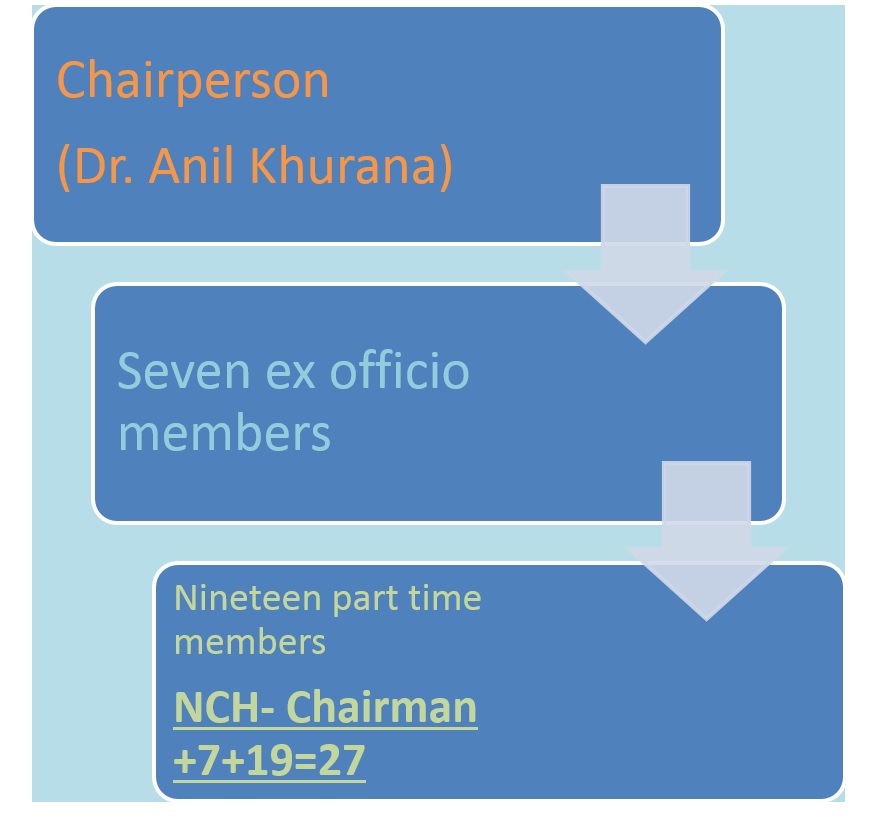

SEVEN EX OFFICIO MEMBERS –
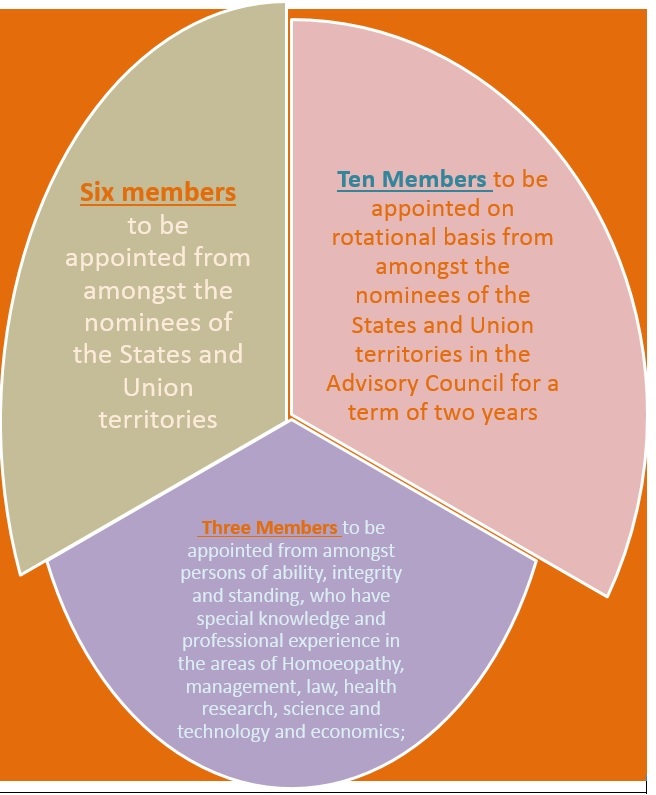
NINETEEN PART TIME MEMBERS –
(a) Three Members to be appointed from amongst persons of ability, integrity and standing, who have special knowledge and professional experience in the areas of Homoeopathy, management, law, health research, science and technology and economics;
(b) Ten Members to be appointed on rotational basis from amongst the nominees of the States and Union territories in the Advisory Council for a term of two years in such manner as may be prescribed.
(c) six members to be appointed from amongst the nominees of the States and Union territories, of the Advisory Council for a term of two years
Provided that no Member shall either himself or through any of his family members, directly or indirectly, own or be associated with or have any dealings with the managing body of a private or non-government medical institution
Explanation.–– The term “leader” means the Head of a Department or the Head of an Organisation.
Search committee for appointment of Chairperson and Members.
POWERS AND FUNCTIONS OF NCH
- The Commission shall meet at least once every quarter
- Lay down policies for maintaining a high quality and high standards in education of Homoeopathy ,make necessary regulations for regulating medical institutions, medical researches and medical professionals in this behalf;
- Assess the requirements in healthcare, including human resources for health and healthcare infrastructure and develop a road map for meeting such requirements;
- Frame guidelines and lay down policies by making such regulations as may be necessary for the proper functioning of the Commission, the Autonomous Boards and the State Medical Councils of Homoeopathy & also Ensure coordination among the Autonomous Boards;
- Exercise appellate jurisdiction with respect to decisions of the Autonomous Boards;
- Make regulations to ensure observance of professional ethics in Medical profession and to promote ethical conduct
- Frame guidelines for determination of fees and all other charges in respect of fifty percent of seats in private medical institutions and deemed to be Universities which are governed under the provisions of this Act.
COMPOSITION OF ADVISORY COUNCIL FOR HOMOEOPATHY
a) The Chairperson of the Commission shall be the ex officio Chairperson of the Council;
(b) Every Member of the Commission shall be ex officio member of the Council;
(c) One Member- each State- Vice-Chancellor of a University in that State, possessing qualifications in Homoeopathy- nominated by that State Government, and one member -each Union territory- Vice Chancellor of a University in that Union territory, possessing qualifications in Homoeopathy- nominated by the Ministry of Home Affairs in the Government of India- Vice-Chancellor possessing qualifications in Homoeopathy is not available, a Dean or Head of Faculty possessing qualifications in Homoeopathy shall be nominated;
(d) One member to represent each State and each Union territory from amongst elected members of the State Homoeopathy Medical Council, to be nominated by that State Medical Council;
(e) The Chairman, University Grants Commission;
(f) The Director, National Assessment and Accreditation Council;
(g) Four Members to be nominated by the Central Government from amongst persons holding the post of Director in the Indian Institutes of Technology, Indian Institutes of Management and the Indian Institute of Science;
(h) The terms of non-ex officio Members in the Council shall be four years
FUNCTIONS OF ADVISORY COUNCIL FOR HOMOEOPATHY
- (1) Primary platform through which the States and Union territories may put forth their views and concerns before the Commission and help in shaping the overall agenda, policy and action relating to medical education, training, research and development of Homoeopathy.
- (2) The Council shall advise the Commission on maintenance of the minimum standards in all matters relating to medical education, training, research and development.
- (3) The Council shall advise the Commission on measures to enhance equitable access to medical education
- Meet at least twice in a year
- One-half of the Members – for 1quoram
- Any decision by voting of members
COMPOSITION OF AUTONOMOUS BOARDS
- The Central Government shall, by notification, constitute the following Autonomous Boards, under the overall supervision of the Commission, to perform the functions assigned to such Boards under this Act, namely:—
(a) Homoeopathy Education Board
(b) Medical Assessment and Rating Board for Homoeopathy
- Board of Ethics and Registration for Homoeopathy
- Each Board an autonomous body which shall carry out its functions under this Act in accordance with the regulations made by the Commission.

Eligibility, Term of office, meetings for president and members of Autonomous Board
- Eligibility -Persons of outstanding ability, proven administrative capacity and integrity, possessing post-graduate degree in respective disciplines from a recognised University and having experience of not less than fifteen years in respective fields, out of which at least seven yrs shall be as a leader
- Term of office – Not exceeding four years and shall not be eligible for any extension or re-appointment
- Meetings – Meet at least once a month
HOMOEOPATHY EDUCATION BOARD

HOMOEOPATHY EDUCATION BOARD – FUNCTIONS
- Determine the standards of education at the undergraduate, postgraduate and super-speciality levels by developing a competency based dynamic curriculum for Homoeopathy as per the need of country and oversee all aspects of relating thereto;
- Frame guidelines on setting up of medical institutions for imparting undergraduate, postgraduate and super-speciality courses in Homoeopathy, having regard to the needs of the country, the global norms and the regulations made under this Act;
- Determine minimum requirements and standards for conducting of courses and examinations in medical institutions by defining standards and norms for infrastructure, faculty and quality of education and research in medical institutions of Homoeopathy
- Specify norms for compulsory annual disclosure, electronically and otherwise, by medical institutions of Homoeopathy in respect of their functions that has a bearing on the interest of various stakeholders including students, faculty, the Commission and the Government;
- Facilitate development and training of faculty Members; research programmes
- Grant recognition to medical qualifications of Homoeopathy at all levels

- MEDICAL ASSESSMENT AND RATING BOARD FOR HOMOEOPATHY
- MEDICAL ASSESSMENT AND RATING BOARD FOR HOMOEOPATHY – FUNCTIONS –
* Determine the process of assessment and rating of medical institutions on the basis of their compliance with the standards laid down by the Homoeopathy Education Board
* Grant permission for establishment of a new medical institution in accordance with the provisions of section 29
* Carry out inspections of medical institutions for assessing and rating such institutions
*Hire and authorize any other third party agency or persons authorized by the Medical Assessment and Rating Board for Homoeopathy for carrying out inspections of medical institutions for assessing and rating such institutions – NAAC, NABH etc.
* Conduct, or where it deems necessary, empanel independent rating agencies to conduct, assess and rate all medical institutions, within such period of their opening, and every year
* Make available on its website or in public domain, the assessment and ratings of medical institutions at regular intervals
* Take such measures, including issuing warning, imposition of monetary penalty, reducing intake or stoppage of admissions and recommending to the Commission for withdrawal of recognition, against a medical institution for its failure to maintain the minimum essential standards specified by the Homoeopathy Education Board

BOARD OF ETHICS AND REGISTRATION FOR HOMOEOPATHY
BOARD OF ETHICS AND REGISTRATION FOR HOMOEOPATHY – FUNCTIONS –
# Maintain a National Register of all licensed practitioners of Homoeopathy in accordance with the provisions of section31;
# Regulate professional conduct and promote medical ethics in accordance with the regulations made under this Act: Provided that the Board of Ethics and Registration for Homoeopathy shall ensure compliance with the code of professional and ethical conduct through the State Medical Council, in a case where such State Medical Council has been conferred power to take disciplinary actions in respect of professional or ethical misconduct by medical practitioners under respective State Acts;
# Develop mechanisms to have continuous interaction with State Medical Councils of Homoeopathy to effectively promote and regulate the conduct of medical practitioners of Homoeopathy.
National examination
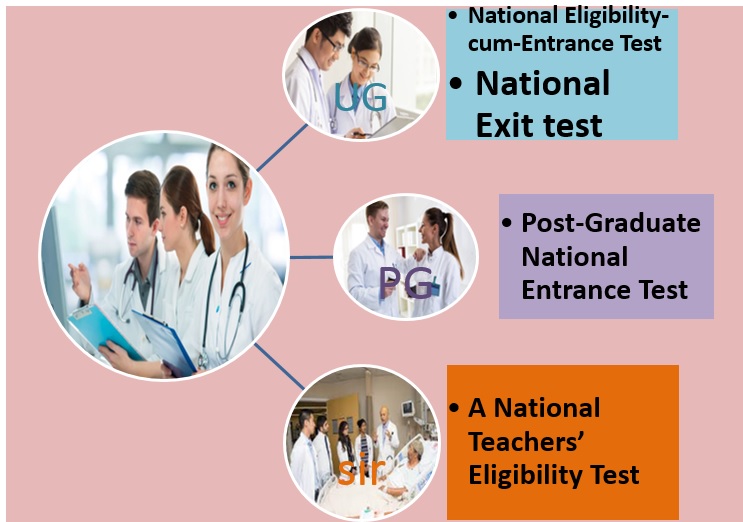
NATIONAL EXAMINATION – FOR UG
- 1) There shall be a uniform National Eligibility-cum-Entrance Test, for admission to the undergraduate in Homoeopathy in all medical institutions governed under this Act.
- (2) The Commission shall conduct the National Eligibility-cum-Entrance Test in English and in such other languages, through such designated authority
- (3) The Commission shall specify manner of conducting common counselling by the designated authority for admission to all the medical institutions
- Provided that the common counselling shall be conducted by the designated authority of ––
- (i) the Central Government, for All India seats; and
- (ii) the State Government, for the remaining seats at the State level.
NATIONAL EXIT TEST
- A common final year undergraduate medical examination, to be known as the National Exit Test, shall be held for granting license to practice as medical practitioner of Homoeopathy and for enrolment in the State Register or National Register
- (2) The Commission shall conduct the National Exit Test for Homoeopathy in English and in such other languages, through such designated authority
- (3) The National Exit Test shall become operational on such date, within three years from the date on which this Act comes into force – may start from 2023
POST GRADUATE NATIONAL ENTRANCE TEST
- (1) A uniform Post-Graduate National Entrance Test shall be conducted for admission to postgraduate courses in Homoeopathy
- (2) The Commission shall conduct the National Entrance Test for admission to postgraduate courses in English and in such other languages, through designated authority.
- (3) The Commission shall specify manner of conducting common counseling by the designated authority for admission to the postgraduate seats in all medical institutions.
NATIONAL TEACHERS ELIGIBILITY TEST FOR HOMOEOPATHY
- 1) A National Teachers’ Eligibility Test shall be conducted separately for the postgraduates of Homoeopathy who desire to take up teaching profession in that discipline.
- (2) The Commission shall conduct the National Teachers’ Eligibility Test for Homoeopathy through such designated authority
- (3) The National Teachers’ Eligibility Test for Homoeopathy shall become operational on such date, within three years from the date on which this Act comes into force- may start from 2023
NATIONAL REGISTER AND STATE REGISTER OF HOMOEOPATHY
- The Board of Ethics and Registration for Homoeopathy shall maintain a National Register containing the name, address, all recognised qualifications possessed by a licensed medical practitioner of Homoeopathy in electronic form.
- Every State Medical Council shall maintain and regularly update the State Register in the specified electronic format and supply a physical copy of the same to the Board of Ethics and Registration for Homoeopathy within three months of the commencement of this Act. electronic synchronization of the National Register and the State Registeris done in such a way that any change in one such register is automatically reflected in the other register.
- RIGHT OF THE PERSON TO PRACTICE HOMOEOPATHY,SIGN A MEDICAL OR FITNESS CERTIFICATE AND GIVE EVIDENCE AT ANY INQUEST
- (a) Allowed to practice Homoeopathy as a qualified practitioner:
- (b) Hold office as a physician or a surgeon or any other office, by whatever name called, which is meant to be held by a physician or surgeon
- (c) Entitled to sign or authenticate a medical or fitness certificate or any other certificate required by any law to be signed or authenticated by a duly qualified medical practitioner;
- (d) Entitled to give evidence at any inquest or in any court of law as an expert under section 45 of the Indian Evidence Act, 1872 on any matter relating to Homoeopathy
OBLIGATIONS OF UNIVERSITY AND MEDICAL INSTITUTES
- Every University and medical institutions covered under this Act
- Maintain a website at all times and display in its website all such information as may be required by the Commission or an Autonomous Board
JOINT SITTING OF THE COMMISSION
There shall be a joint sitting of the Commission, the National
Commission for Indian System of Medicine and the National Medical Commission,
at least once a year
- A joint sitting to enhance the interface between Homoeopathy, Indian System of Medicine and modern system of medicine.
- STATE GOVT TO PROMOTE PRIMARY HEALTHCARE IN RURAL AREA
Every State Government may, for the purposes of addressing or promoting healthcare in rural areas, take necessary measures to enhance the capacity of the healthcare professionals.
Summary –
Due to distribution of various functions among three autonomous boards National commission for Homoeopathy become more efficient. It tries to give justice to students, teachers and homoeopaths. After proper implementation of the act we can expect change –changing the gear towards progress . As the new changes like exit test, registration, teacher’s eligibility test and rating of colleges will surely make improvement in homoeopathy field.
College – Rating and accreditation process leads to qualitative improvement – infrastructure, teaching, hospital etc.
- Teachers – Teachers code, teacher’s eligibility test and research oriented, research boosting approach of commission leads to promote and encourage good teachers. Budding teachers will have made themselves updated.
- Students – Due to exit test students has to prepare themselves for more practical and clinical based knowledge.
- Community connect Homoeopath – concentration on Rural area is boosted so homoeopathy reach at root level.
These autonomous boards started working immediately and formed new MSR . The said new MSR was already sent for the recommendations from stakeholders – colleges, universities, teachers and students general public etc.
New MSR recommends –Some Highlights
-Change in duration of BHMS course – 1st yr- 1&1/2 yr,2nd yr- 1 yr, 3rd yr – 1 yr 4th yr- 1 yr, Intern ship – 1 yr.
– Subject Social and preventive medicine included in 2nd yr
– New subjects like modern pharmacology and research methodology included
– Salary structure for teachers for the first time formed etc., etc……
- NCH in recent days provide guidelines for determination of fees and all other charges in respect of fifty per cent of seats in private medical institutions and deemed to be Universities
- In Recent development now students can take admission in M.D.(Hom)in new subject – Social and preventive medicine.
All these developments in our field will surely helpful in progression and hope that
Together, we can craft a more resilient, adaptive, and sustainable future.
About Author:
Dr. S. C. Kumbhejkar M.D.(Hom)L.L.B.PHD (Sch), Prof. & Head of Dept. of FMT,
Sri. Veerabhadreshwar Homeopathic Medical College, Humanabad,Karnataka.




